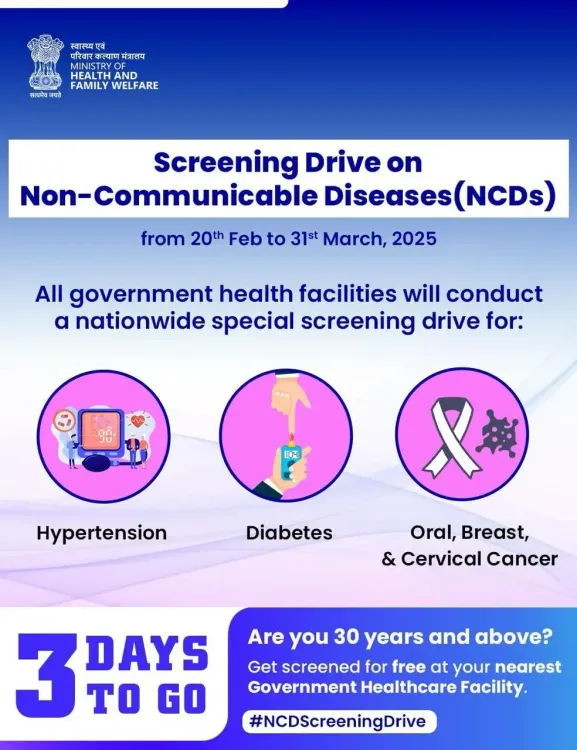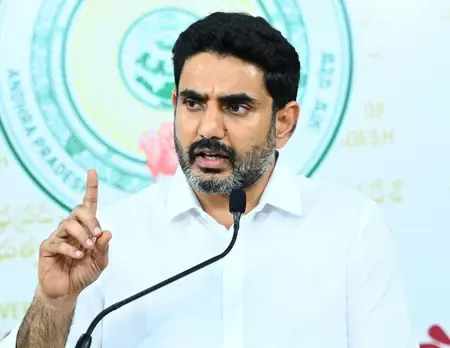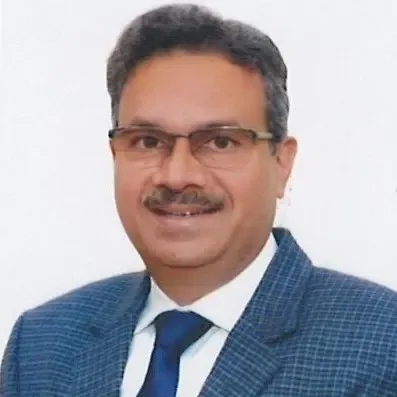Health Ministry Initiates Nationwide Screening Campaign for High Blood Pressure, Diabetes, and Cancer

Synopsis
Key Takeaways
- Free screenings for NCDs available from Feb 20 to Mar 31.
- Targeted diseases include hypertension, diabetes, and certain cancers.
- Individuals over 30 are encouraged to participate.
- Diabetes symptoms to watch for include fatigue and blurred vision.
- Rising NCDs in India pose a public health challenge.
New Delhi, Feb 18 (NationPress) The Ministry of Health and Family Welfare (MoHFW) has unveiled a comprehensive nationwide screening campaign targeting non-communicable diseases (NCDs) such as high blood pressure, diabetes, and cancer.
The screening initiative is scheduled to take place from February 20 to March 31. The Health Ministry has urged individuals aged 30 and above to visit their nearest government health facility for screening.
"Take control of your health – participate in the nationwide screening campaign for non-communicable diseases (NCDs) from February 20th to March 31st, and receive free screenings at your local government healthcare center,” stated the MoHFW in a recent social media update.
“All government health facilities will host a nationwide special screening event for: hypertension, diabetes, oral, breast, and cervical cancer," it further noted.
The Ministry also provided an infographic highlighting diabetes symptoms that should not be overlooked, including: blurred vision, increased appetite, delayed wound healing, fatigue, constant thirst, sudden weight loss, and frequent urination.
“Do not disregard these diabetes symptoms!” cautioned the Ministry.
This screening initiative is timely, as the country is witnessing a troubling rise in NCDs. Data from the Indian Council of Medical Research-National Institute of Nutrition (ICMR-NIN) reveals that NCDs are responsible for 66 percent of all mortality in India.
The prevalence of cardiovascular diseases, diabetes, chronic respiratory diseases, and cancers poses a significant public health challenge, particularly for those over 30.
In contrast to more developed Western nations, where NCDs typically occur later in life, India is confronting these diseases at a younger age.
Alarmingly, two-thirds of Indians affected by NCDs are within the age range of 26-59, which are considered the most productive years of life. This is largely attributed to poor dietary choices and unhealthy lifestyle habits.
A recent study conducted by ICMR-NIN highlights that 56 percent of the disease burden stems from unhealthy eating habits.
Recently, Prime Minister Narendra Modi, speaking to athletes and delegates at the 38th National Games in Dehradun, emphasized the significance of maintaining a healthy body to foster a healthy mind, ultimately contributing to a healthy nation.
In discussing the Fit India Movement, he stressed the importance of exercise and a well-balanced diet, focusing on reducing unhealthy fats and oils in food. He recommended a 10 percent reduction in daily oil usage.









